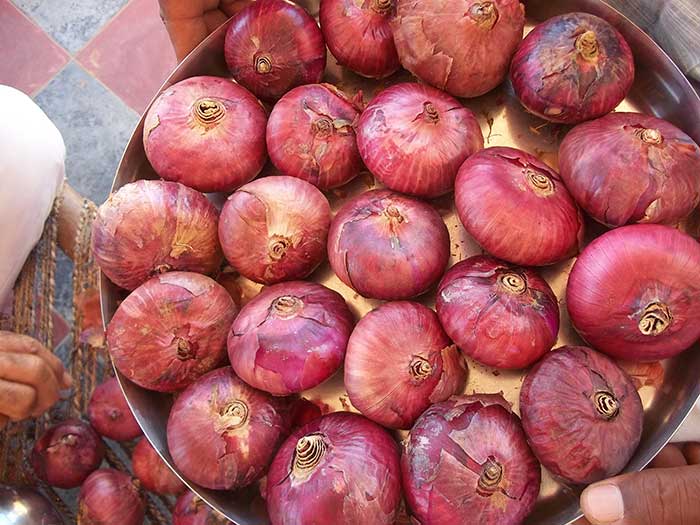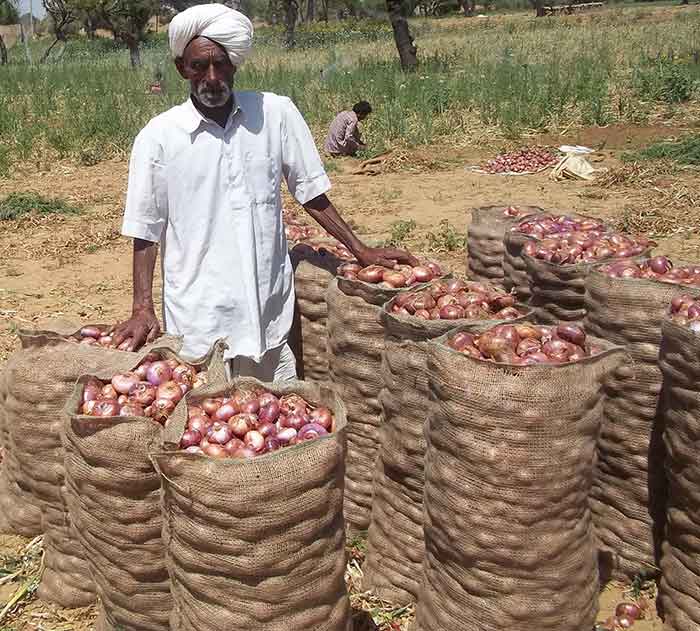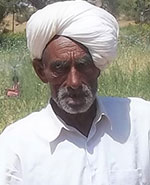Genesis
Due to the scarcity of irrigation water in the Sikar region, farmers dug enough wells. Despite having three wells in Shri Manaram's field, he did not get enough water for irrigation. This problem of the region inspired him to experiment and test the crop varieties performed well under water stress conditions. In every cropping season, he tried to use the crop and varieties with drought tolerance.
Plagued by this problem, he always used to try to devise experiments in search of a variety that requires less irrigation and having early maturity and can survive in the drought conditions that are prevalent in the area. In Rabi 1983, Manaram cultivated some local varieties of onion in his farm. He was very particular in selecting light-red (whitish) coloured onions, as their number was less in the population. He tried these onions at his own home and found them to be delicious in taste, but they exhibited a very less shelf life. He then preserved some bulbs by drying then and sowed them in the next season. He observed that the plants from the whitish bulb were early maturing and yielded well in comparison to the crop from dark-red coloured onion even under water stress and low irrigation conditions. Keeping this in mind while harvesting, he preferred to keep the whitish coloured onion for the seed to the red/pinkish ones. He stabilized the characters over a period of ten years (1983 to 1993) by performing the repeated selection. Once he was satisfied with the yield stability of the variety and the drought-tolerant characteristic of the variety, he named the variety as Rashidpura onion.
Innovation
The variety developed by Manaram is an early maturing, less water-dependent, and is superior in taste to other local varieties. This variety takes 110-115 days after transplanting as compared to the normally cultivated varieties (125-140 days) and has higher yield (40 metric tons bulbs per hectare) than the commercially cultivated varieties (25-30 metric tons bulbs per hectare) in the area. The variety has attained wide popularity in the northern states (Rajasthan, Delhi, Punjab and Haryana) for its taste and performance. The variety was tested and validated for its performance at Rajasthan Agricultural Research Institute Durgapura, Rajasthan during Rabi 2015-16 and 2016-17. Deputy Director, Agriculture (Extension), Sikar and ARS, Durgapur, Jaipur had appreciated the variety developed by Manaram, especially recognizing the taste and good performance under drought conditions.
Background
Late Shri Manaram Choudhary had developed an early maturing and drought-tolerant variety of onion through mass selection, which has also become famous in the northern states of Haryana, Delhi, and Rajasthan due to its good taste and performance. He had been practicing farming for over fifty years and onion farming for over thirty years. He lived in a joint family with his four brothers and his children. He had about ten hectares of land. Now the land is being looked after by his sons, where wheat, millet, cluster-bean, and onion crops are cultivated. Manaram was also involved in the dairy business and also owned some cattle. In 2007, Manaram was awarded by NIF for developing an improved variety of onion.
Innovator had been awarded in 4th National Grassroots Innovation Awards of National Innovation Foundation-India.
The variety is in process of the registration (Acknowledgement Number- REG/2015/1782) under the Protection of Plant Varieties and Farmers Rights Act-2001 (PPV&FRA).
The Rashidpura Pyaz (Sanwaloda Selection) onion variety is suitable for the wide onion cultivated areas. The salient features of the variety are as follow:
- Highly adaptable to varying climatic conditions for Rabi and Kharif cultivation.
- Higher yield (40 tons bulbs/ha)
- Delicious taste as compared to commercially cultivated local varieties
- Early maturing (110-115 days)
- It requires less irrigation and can thrive well under drought conditions









